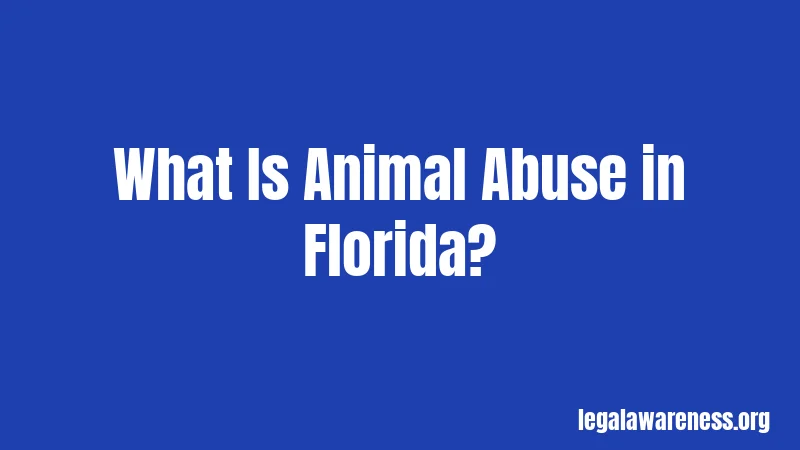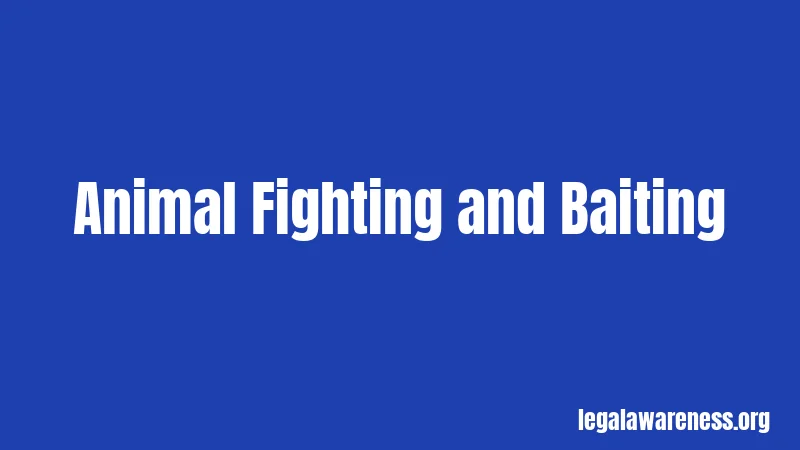Animal Abuse Laws in Florida (2026): The New Database Era
Most people assume animal cruelty laws are weak. They’re not. In Florida, the rules just got way tougher, and if you hurt an animal, your name could end up on a public database for everyone to see. Starting January 1, 2026, Florida is launching something that’s never existed before. Let me break it down for you.
What Is Animal Abuse in Florida?

Animal abuse in Florida covers more than you might think. It’s not just about physically hurting animals.
The law says animal abuse happens when you unnecessarily hurt, neglect, or kill an animal. This includes overloading animals, depriving them of food or water, keeping them without proper shelter, or transporting them in cruel ways. Pretty straightforward.
But here’s where people get confused. There are two types of animal abuse charges in Florida. One is a misdemeanor. The other is a felony. The difference matters. A lot.
Basic Animal Cruelty Laws
Misdemeanor Animal Cruelty
This is what Florida calls basic animal cruelty. Under Florida Statute 828.12, you commit this crime if you unnecessarily overload, torture, or kill an animal. You can also be charged if you deny an animal food, water, or shelter. Transporting an animal in a cruel way counts too.
Think of it like this. Leaving your dog in a hot car? That could be animal cruelty. Not feeding your cat for days? Same thing. These are one-time events or isolated incidents.
The penalties are serious. You could face up to one year in jail. The fine can hit $5,000. That’s the maximum, but judges can hand down whatever they feel fits the crime.
Wondering if this applies to you? If you own a pet, care for animals, or work with them, these laws affect you. No exceptions.
Aggravated Animal Cruelty
Now this one’s way more serious. Aggravated animal cruelty is a third-degree felony in Florida.
You commit this crime when you intentionally cause an animal’s cruel death. Or when you cause excessive or repeated unnecessary pain to an animal. This isn’t a one-time mistake. It’s ongoing torture or intentional killing.
The law says you can get up to five years in prison. The fine maxes out at $10,000. And if you tortured or tormented an animal with intent to injure, mutilate, or kill it, you’re required to get psychological counseling. Yep, mandatory therapy.
Hold on, this part is important. If you’re convicted of aggravated animal cruelty twice, the penalties get even harsher. Florida doesn’t mess around with repeat offenders.
The Big Change: Dexter’s Law

Here’s where things get interesting. In 2025, Florida passed a law called Dexter’s Law. It’s named after a shelter dog who was adopted and then found beheaded days later in a park. Horrible, right?
Governor Ron DeSantis signed this law in May 2025. It became effective July 1, 2025, but the second part launches January 1, 2026. That’s basically now.
What Dexter’s Law Does
Dexter’s Law does two major things. First, it adds a sentencing multiplier for aggravated animal cruelty. This means if you’re convicted, you’ll score more points on the criminal punishment scoresheet. More points equal longer prison time.
Second, and this is huge, Florida is creating a statewide animal abuse database. Starting January 1, 2026, the Florida Department of Law Enforcement will post the names of people convicted of aggravated animal cruelty online. Anyone can look it up.
This database will include anyone who’s been found guilty of animal cruelty. It also includes people who pleaded guilty or no contest to these charges. All 67 counties in Florida send their cases to the state automatically.
Why the Database Matters
The database serves several purposes. Animal shelters can check it before approving adoptions. If you’re rehoming a pet, you can look up potential adopters. Law enforcement can use it during investigations.
Honestly, this is probably the most important change. It creates accountability. Once your name goes on that list, it’s public record. Everyone can see it.
Trooper’s Law: Abandoning Animals During Disasters
Florida also passed another law in 2025. It’s called Trooper’s Law. Remember that dog left chained up during Hurricane Milton? That’s why this law exists.
Under Trooper’s Law, it’s now a third-degree felony to restrain and abandon a dog outdoors during a declared natural disaster. This applies any time there’s a mandatory or voluntary evacuation order in effect.
Before this law, people could leave their pets tied up during hurricanes. Now? You’re looking at up to five years in prison. The law takes animal safety during emergencies seriously.
Animal Fighting and Baiting

Let’s talk about animal fighting. In Florida, making animals fight is illegal. So is baiting animals. Both are third-degree felonies under Florida Statute 828.122.
Animal fighting means forcing animals like dogs, roosters, or bears to fight each other. Baiting means provoking or harassing animals to make them fight. Using live animals to train racing greyhounds counts as baiting too.
What’s Illegal Under the Animal Fighting Act
You can be charged if you do any of these things. Using animals for fighting or baiting is a crime. Owning or operating a facility for animal fights is illegal. Promoting or staging animal fights will get you arrested. Breeding, training, transporting, or selling animals for fighting is against the law.
Here’s one people don’t realize. Even attending an animal fight as a spectator is a felony. Seriously. If you show up to watch, you can be charged. Betting on animal fights is also illegal.
The penalties include up to five years in prison. You could face a $10,000 fine. And the court can ban you from owning animals in the future.
Not sure what counts as a violation? If animals are fighting and humans set it up, it’s probably illegal. The law has some exceptions for hunting and livestock work, but organized fighting is always banned.
Special Rules for Horses and Cattle
Florida has extra protections for certain animals. If you kill or seriously harm a registered breed horse or cattle, you face a second-degree felony charge.
This is more serious than regular animal cruelty. You’re looking at up to 15 years in prison. Plus, there’s a mandatory minimum fine of $3,500 and at least one year in jail. No way around it.
Tripping horses for entertainment or sport is also a third-degree felony. Tripping means using a wire, pole, rope, or other tool to make a horse fall or lose its balance. The only exceptions are when you’re controlling a dangerous horse, identifying ownership, or giving veterinary care.
Additional Penalties You Should Know
Confused about the difference? Let me break it down. Beyond jail time and fines, Florida courts can impose other penalties. They can ban you from owning or possessing animals for a set period. This could be months or years.
If you’re convicted of a crime involving torture or torment, you must undergo psychological or psychiatric counseling. This is mandatory, not optional. The court requires it.
Sound complicated? It’s actually not. The state wants to prevent future abuse. Counseling is part of that prevention.
How Law Enforcement Handles Animal Cruelty
Police officers in Florida can arrest you without a warrant if they witness animal cruelty. They don’t need to go get permission first. If they see it happening, they can take action immediately.
Animal control officers and humane agents can also seize animals that are being neglected or cruelly treated. If a court finds probable cause that abuse occurred, they’ll order the animals seized. The court then arranges for proper care or finds the animals new homes.
Pretty straightforward. The system moves fast when animals are in danger.
What Happens If You See Animal Abuse
If you witness animal abuse in Florida, you should report it. Contact local law enforcement or animal control. You can also reach out to humane societies.
Many counties have specific hotlines for reporting animal cruelty. Look up your county’s animal services department. They’ll guide you through the process.
Reporting is important. Remember, people who abuse animals are five times more likely to harm people too. The FBI tracks this stuff. Studies show that 88% of homes investigated for child abuse also had evidence of animal abuse.
Wait, it gets better. By reporting animal abuse, you might be preventing future violence against people. That’s not an exaggeration. Research backs this up.
The Science Behind These Laws
Here’s something most people don’t realize. Animal abuse often predicts future violence. The FBI includes animal cruelty in its tracking of violent crimes. Why? Because it works as an early warning system.
Studies show animal abusers are way more likely to escalate to violent crimes against humans. This is why Florida takes these laws so seriously. It’s not just about protecting animals. It’s about protecting everyone.
This part can be tricky, honestly. Some people think it’s just about being kind to animals. But lawmakers designed these laws based on decades of research showing links between animal abuse and human violence.
How to Stay Compliant
Most people don’t set out to break animal cruelty laws. They just don’t know the rules. Here’s what you need to do to avoid problems.
Make sure your animals have food, water, and shelter. This isn’t complicated. If you have pets, take care of them. Don’t leave them in hot cars or outside during storms. Don’t use cruel methods of transportation.
If you can’t care for your animals anymore, don’t abandon them. Surrender them to a shelter. Contact rescue organizations. Ask for help. There are resources available.
During emergencies, include your pets in your evacuation plans. Under Trooper’s Law, you can’t leave them behind tied up. Take them with you or make arrangements ahead of time.
Wondering if something counts as abuse? Ask yourself if the animal is suffering unnecessarily. If the answer is yes, stop doing it. Find a better way.
What About Veterinarians?
Veterinarians in Florida get special protection under these laws. If a vet reports suspected animal cruelty or participates in an investigation, they’re immune from civil or criminal liability.
This means vets can report abuse without worrying about getting sued. The law protects them specifically to encourage reporting. It’s working. More vets are speaking up when they see signs of abuse.
Recent Changes and Updates
Besides Dexter’s Law and Trooper’s Law, Florida updates its animal protection laws regularly. The database launching January 1, 2026, represents the latest major change.
Before this, there was no centralized system to track animal abusers. Someone could abuse animals in one county, move to another, and adopt more pets. Now? That’s not happening. The database follows you.
The billboards are already going up across Florida. They warn people that if you abuse an animal, your name goes in the database. The message is clear. Don’t do it.
How Courts Handle These Cases
Prosecutors in Florida take animal cruelty cases seriously. Animal rights groups often get involved. They put pressure on state attorneys to seek maximum punishment.
If you’re charged with animal cruelty, the penalties can surprise you. Even for a first offense. Courts don’t go easy on animal abuse.
Each act of cruelty can be a separate charge. If you abuse multiple animals, you can be charged separately for each one. The charges add up fast.
Frequently Asked Questions
What counts as animal abuse in Florida? Animal abuse includes any act that causes unnecessary pain or suffering to an animal. This covers physical harm, neglect, abandonment, and deprivation of food, water, or shelter.
Will I go to jail for animal cruelty? Maybe. For misdemeanor cruelty, you could get up to one year in jail. For aggravated cruelty, the maximum is five years in prison. Even first-time offenders can face jail time.
How long does my name stay on the animal abuse database? The law doesn’t specify a removal date. Once you’re convicted of aggravated animal cruelty and your name goes on the database, it stays there as public record.
Can I get my animal back if it was seized? Probably not. If a court finds you abused or neglected your animal, they’ll place it with a shelter or new owner. You might also be banned from owning animals in the future.
What should I do if I’m charged with animal cruelty? Get a lawyer immediately. These cases are serious and the penalties are harsh. An attorney can help you understand your options and build a defense.
Final Thoughts
Florida’s animal abuse laws are stricter than ever. The new database changes everything. If you hurt an animal, everyone will know. Your name gets posted online. Shelters can see it. Employers can find it. It’s permanent.
The message is simple. Treat animals right or face serious consequences. With Dexter’s Law now in effect and the database launching January 1, 2026, Florida is sending a clear signal. Animal abuse won’t be tolerated.
Stay informed, treat animals with respect, and if you see abuse, report it. These laws exist to protect animals and keep communities safe.
References
- Florida Statute 828.12 – Cruelty to Animals – https://www.flsenate.gov/laws/statutes/2024/828.12
- Florida Statute 828.122 – Fighting or Baiting Animals – https://www.flsenate.gov/Laws/Statutes/2023/0828.122
- Florida House Bill 255 (2025) – Dexter’s Law – https://www.flhouse.gov/Sections/Bills/billsdetail.aspx?BillId=80848
- Florida Senate Bill 150 (2025) – Trooper’s Law – https://www.flgov.com/eog/news/press/2025/governor-ron-desantis-signs-troopers-law-and-dexters-law
- Florida Department of Law Enforcement – Animal Cruelty Database Information – https://www.fdle.state.fl.us

My Nabor has put out rat poison along his finch for my dog And has a device that puts out 110 decimals to harm my dog hearing
Need help from the human resource to stop this man
I personally have had Humane society not responding in past lake county. could not respond because of lacking care providers,problems with that. at local shelters.
Humane Societies over Lake County Shelters for all Animals just Shelters in general.